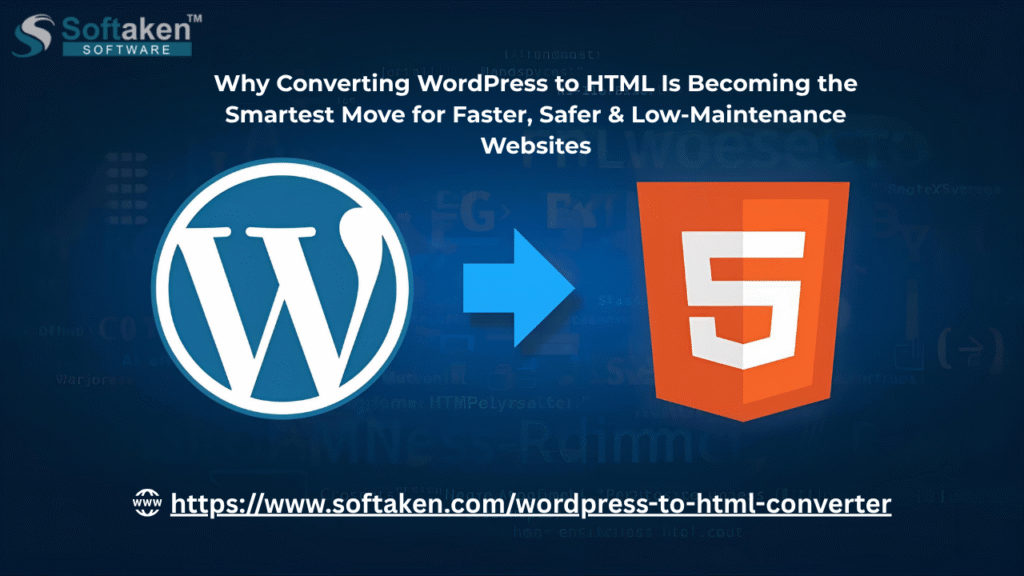Table of Contents
Introduction
Reasons Behind WordPress Users Switch to Static HTML
Problems WordPress Users Have to Deal with These Days
How HTML Methods Solve These Common Problems
Converting WordPress to HTML: What Changes
Who Should Look at This Conversion
Modern Hosting Options for Static Sites
Customer Testimonials
FAQ
Conclusion
Introduction
For the most part, websites start out on WordPress because of the benefits that it offers such as flexibility, power, and ease of management. The narrative, however, changes with time, as additional plugins are installed, themes get heavier, hosting prices increase, and security warnings become more frequent. A website that used to be simple is now slow, unstable and costly to maintain.
This explains the massive shift that is happening right now. Users are converting their WordPress dynamic sites into static HTML sites by the use of tools like WordPress static site generator, WordPress export converter, and WordPress HTML exporter.
The factor leading to this decision is that HTML sites are very fast, secure, and free from maintenance—without compromising design and SEO.
Reasons Behind WordPress Users Switch to Static HTML
Sure, WordPress is a great tool, but it’s also a quite heavy one:
- It is based on PHP
- Needs a MySQL database
- Must constantly update theme/plugin
- Frequently targeted for security issues
- As a rule, slows down with the increase of website size
With HTML, none of these problems exist. For that matter, a good number of users have opted for such tool as:
- WordPress to static hosting converter
- WordPress offline converter
- WordPress migration tool
These software make it possible for users to still have their website design, structure, and write-ups, but without the heavy backend parts that were in place.
Problems WordPress Users Have to Deal with These Days
Slow Page Speed
In general, even the most basic web page can slow down because of plugin bloat and database queries.
Security Threats
Hard pushes on password guessing, vulnerabilities in plugins, and bot attacks constitute the daily fight of WordPress users.
Increasing Hosting Costs
Dynamic servers (PHP + MySQL) cost a lot—especially when it’s a high-traffic site.
High Maintenance
Themes, plugins, backups, updates… These works never stop.
Unexpected Downtime
The entire site can be out of service because of an update of one malfunctioning plugin.
How HTML Methods Solve These Common Problems
HTML completely does away with the backend. There is no PHP. There is no database. There is no admin panel. Which, in a summary, means the following:
Super-Fast Loading
The reason why a website coded with HTML opens straight away is that such a site is made of neat files, and it doesn’t take processing time.
Zero Security Risks
Since there is no login page, there is nobody to hack. Also, because there are no plugins, there are no vulnerabilities.
Very Low Hosting Cost
Static files may be hosted on:
- Netlify
- GitHub Pages
- AWS S3
- Basic shared hosting
No Maintenance Required
The files, once transformed, are free from any updating needs—period.
SEO Stability
Speedy sites are what search engines are looking for. Therefore, static websites are mostly likely to rank higher.
Converting WordPress to HTML: What Changes
The parts that a good conversion tool takes out are:
- Posts
- Pages
- Menus
- Images
- CSS / layout
- Internal links
After that, it develops an utterly HTML version of your entire web space.
This process is available on different platforms through:
- WordPress to Netlify converter
- WordPress to Jekyll converter
- WordPress to Hugo converter
In other words, you can put your site wherever you want with a ready static hosting of the future.
Who Should Look at This Conversion
Blogger
If you require speed, SEO, and low costs, then you are the one. Tools like WordPress blog converter, WordPress pages to HTML can be used.
Web Agencies
Help clients to have websites which are free from the worry of need for regular check and service.
Developers
With minimum effort they can put Netlify, Hugo, or Jekyll clean, compact HTML code live.
Business Owners
If you are business owners, then you are the ones in need of stable, secure, and long-term websites.
Big Websites
An ideal solution for the archive utilizing the WordPress archive tool.
Modern Hosting Options for Static Sites
The HTML site you have converted can be deployed to your choice of hosting services such as:
- Netlify (super fast CDN hosting)
- GitHub Pages (free hosting)
- Jekyll + GitHub Workflows
- Amazon S3 (enterprise hosting)
- Cloudflare Pages
Static hosting runs at a lower price, higher speed, and is by far more secure than the traditional type of hosting.
Customer Testimonials
Riya Sharma – Lifestyle Blogger
“The time it took for my site to be loaded was reduced from 7 seconds to 1 second after the site conversion. SEO has upgraded itself automatically. Why didn’t I do this before!”
Daniel Wright – Developer
“I deploy static versions of my clients’ websites for them. There is no need for maintenance, no downtime, and no plugin conflicts. Everything has become easier.”
Rohit Verma – Small Business Owner
“Hackers were trying to log into my WordPress account every day. After I changed to HTML, these attempts have stopped entirely.”
FAQ
1. After the conversion, will the design of my website be the same?
Sure. A proper WordPress to HTML conversion tool will definitely keep your exact layout, menus, fonts, color scheme, and image the same – only the backend will be removed.
2. Is it possible to update my site once it’s been converted to HTML?
Certainly. Change your content in WordPress → convert again → put up the new HTML version. No complicated steps are required.
3. Does changing to HTML make the site safer for real?
Definitely. HTML does not have a login page, plugins, or a database, so there’s nothing for the hackers to exploit.
4. Will my SEO ranking go down?
Not at all. Actually, SEO gets better because sites in HTML are quicker in loading and are more Google-friendly.
5. What are the hosting options for my HTML site?
If you want to host it, you may choose any of these locations: Netlify, GitHub Pages, S3 or any local hosting provider.
Conclusion
The idea of transforming WordPress into HTML is not merely an alternative, but rather, it is gradually becoming the first choice of the owners of the contemporary websites who desire fast loading time, safety, and stability over time. By means of HTML, you get rid of the problem of plugin conflicts, server errors, the high price of hosting, and security risks, and at the same time, you preserve your original design just like before.
The transition could hardly be more straightforward due to powerful tool such as the Softaken WordPress to HTML Converter which guarantees precise extraction, neat HTML output, and simple deployment to such platforms as Netlify, Hugo, or Jekyll. If this is the kind of website you want, one that is speedy and requires zero maintenance in the future, then Softaken is one of the most dependable solutions you can turn to nowadays.



